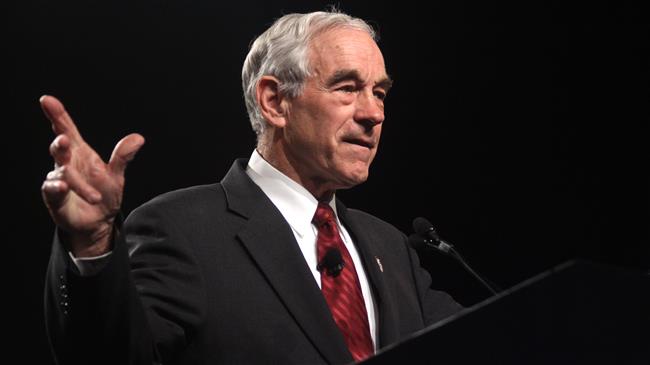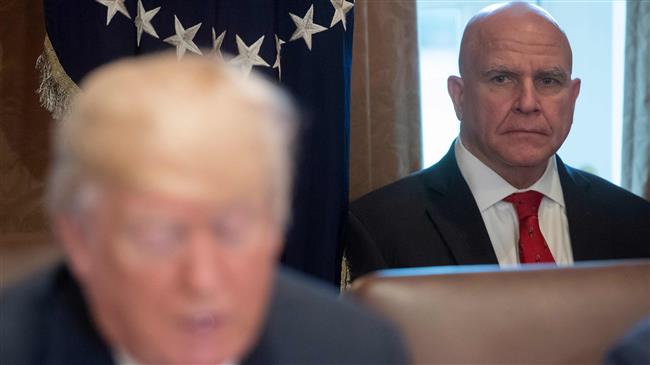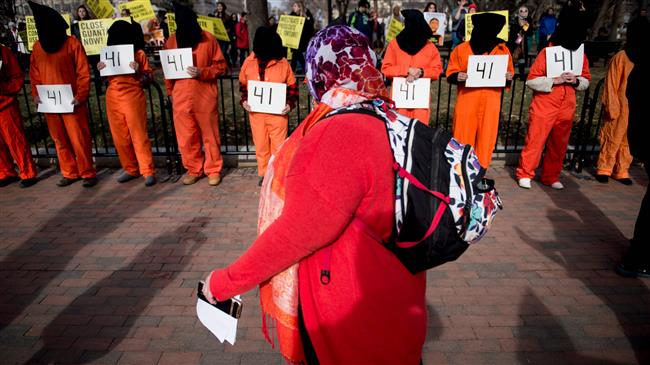Trump’s SOTU was declaration of military aggression against Russia, Iran, China: Writer
US President Donald Trump’s State of the Union (SOTU) speech was a declaration of military aggression against Russia, Iran, China, Yemen, and the Palestinian people, an American writer and political commentator says.
James Petras, who has written dozens of books on international issues, made the remarks in an interview with Press TV while commenting on Trump’s first State of the Union address which was delivered to a joint session of the US Congress on Tuesday night.
“I think it’s a general consensus here that Trump combines moderate appearance and very aggressive content. On the one hand he talked about building alliances, he talked about making America strong, working in cooperation with overseas allies,” Professor Petras said.
"And on the other hand he proposed keeping the Guantanamo concentration camp open, using unlawful methods for interrogating prisoners,” he added.
“But most of all he overlooked many things including the US continuing bombing of Yemen, the wars continuing in Syria, and in Iraq. He’s working with the Daesh, with Kurds,” he stated.
"He’s in general very hostile to Russia putting leading political and business leaders on the black list, threatening them with new sanctions,” he continued.
“He calls China a rival, a competitor. So essentially he has simply deepened and extended a belligerent position which he then extends to Iran. He has been following very closely in line with the policies of Israel, recognizing Jerusalem [al-Quds] as the capital of Israel, and looking to alliances with the dictatorship in Saudi Arabia,” Petras said.
‘Trump looking for pretext to break Iran deal’
“So I think the consensus here is that Trump is looking for a pretext to effectively break the agreement between the United States and Iran,” the analyst said.
“He says he wants to modify it but everybody in Europe, Russia, and China rejects the idea that he will reform the agreement. Essentially what Trump is saying that he will impose new conditions which are unacceptable to Iran, which are unacceptable to the other signees to the agreement.”
Trump has repeatedly denounced the landmark nuclear accord. During his presidential election campaign, he threatened to shred the deal. He has been desperately trying to undo the nuclear agreement with Iran, which restricts his ability to pursue harsher policies against the Islamic Republic.
Trump's anti-Iran rhetoric comes as the longstanding Western dispute over Tehran's nuclear program was settled after the conclusion of a landmark nuclear agreement in 2015. UN Security Council Resolution 2231 also endorsed the nuclear deal, which went into effect in January 2016.
The International Atomic Energy Agency (IAEA) has also confirmed Iran's commitment to the terms of the nuclear agreement, dubbed the Joint Comprehensive Plan of Action (JCPOA).
Iran and the five permanent members of the United Nations Security Council -- the United States, France, Britain, Russia and China -- plus Germany started implementing the JCPOA on January 16, 2016.
Trump has recently undermined the multilateral deal by introducing new rounds of sanctions against Iran.
‘Nothing positive in Trump’s foreign policy’
Professor Petras said, “There is nothing positive in Trump’s foreign policy. He is increasing the budget for nuclear arms. He’s looking to increase the military threats to [North] Korea. And I think he is moving in the same direction with Iran.”
“And I think his so-called praise of the Iranian opposition is false. Whatever people are critical of the current situation in Iran are totally against Trump’s military posturing, and alliances with Saudi Arabia, and Israel,” he stated.
“I think we can look at this speech as a declaration of military aggression against Russia, against Iran, against China, against Yemen, against the Palestinian people,” the veteran commentator noted.
“So whatever illusions people had that perhaps Trump would moderate his policies, turned his back on extremism, he has in fact embraced the most extremist people in the United States, which he is trying to consolidate around his presidency which has been below 35 percent approval rating up to now,” he concluded.
VIDEO | Press TV's news headlines
VIDEO | Intl. conference honors martyred journalists in Gaza, Lebanon
VIDEO | Israel relies on attacking civilians, urban areas to pressure Hezbollah
VIDEO | Suppressing voices of truth
VIDEO | Martyrs of Islamic Jihad movement laid to rest in Damascus
VIDEO | Gazans produce charcoal to get warm
Hezbollah retains ‘Fire for Fire’ strategy; takes Tel Aviv under ballistic missile barrage
Iran, Azerbaijan top brass underline military, defense cooperation













 This makes it easy to access the Press TV website
This makes it easy to access the Press TV website